英语动词的三种语气
动词的语气、虚拟语气
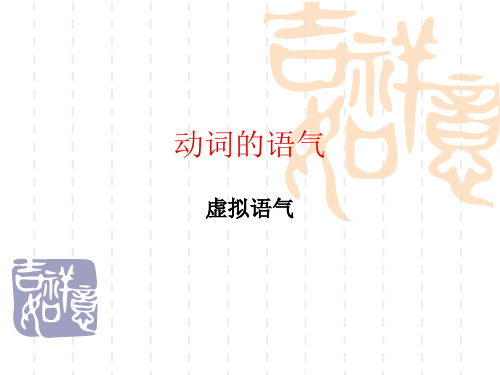
▪ If they didn’t take physical exercises every day, they wouldn’t be so healthy.
▪ (fact: They take physical exercises every day, so they are very healthy.)
▪ 要是有人警告过他,他就不会吃那个食物 了。
▪ If he had been warned, he would not have taken that food.
▪ 如果你服从命令的话,灾难就不会发生了。 ▪ If you had obeyed the order, the
disaster could not have happened.
▪ 虚拟语气是一种特殊的动词形式,用来表 示说话人所说的话不是一个事实,而只是 一种愿望、假设、怀疑、建议、猜测、可 能或纯粹的空想等。
▪ 在英语中,虚拟语气是通过句子中谓语动词的特 殊形式来表示的。这又一次证明动词在英语中的 核心地位,又一次证明要学好英语语法,就要学 好英语动词。由于虚拟语气是通过句子中谓语动 词的特殊形式来表示的,因此,掌握虚拟语气中 所使用的各种谓语动词形式变化是掌握虚拟语气 的关键,这也是虚拟语气的难点。虚拟语气本身 也是英语语法的一个难点。学习虚拟语气的方法 是分别弄通虚拟语气的各种句型和结构,各个击 破。下面对虚拟语气在各种句式中的用法分别介 绍。
▪ 现将虚拟语气在条件句中的各种具体形式 和用法分述如下:
▪ 1. 对现在的虚拟,表示与现在事实相反的 假设时,条件状语从句的谓语动词用过去 式(be的过去式用were),而主句中的谓语 动词用would (should, could, might) + 动词 原形。见下表:
高中英语语法:虚拟语气

---------------------------------------------------------------最新资料推荐------------------------------------------------------高中英语语法:虚拟语气虚拟1/ 35虚拟语气定义1.英语动词有三种语气: 陈述语气,祈使语气和虚拟语气。
2. 定义:用来表示说的话不是事实,或者是不可能发生或可能性比较小的情况,而是一种愿望,建议,假设的语气叫虚拟语气。
---------------------------------------------------------------最新资料推荐------------------------------------------------------ 虚拟语气的考点1.一般条件句中虚拟语气的用法; 2.条件句中虚拟语气的倒装; 3.名词性从句中虚拟语气的用法; 4.状语从句中虚拟语气的用法; 5.几种特殊结构中虚拟语气用法; 6.虚拟语气与陈述语气的判定。
3/ 35一般条件句中虚拟语气的用法---------------------------------------------------------------最新资料推荐------------------------------------------------------ 1.一般条件句中的虚拟语气时间过去If 条件句 had donewould should could might主句 +have done sth现在助动词 be用 were 实义动词 do 用 didwould should could might+ do sth将来did / were should do were to dowould should + do sth could Might5/ 35与现在事实相反1. If I had taken your advice, I wouldn’t have made a mistake.2. If he had been there, it wouldn’t have happened. 与过去事实相反3. If I had HIV, I would know becauseI would feel sick.4. If I were you, I would give AIDS patienta hug.---------------------------------------------------------------最新资料推荐------------------------------------------------------ 与未来事实可能相反5. If it should rain tomorrow, they wouldn’t go for an outing.6. I think we could do it, if we planned it properly and could borrow the tools.7. If we were to have three days off , we would enjoy a very happy life.7/ 351.If I were you, I _C___ buy the house right now. A. won’t B. don’t C. wouldn’t D. can’t2. _B____more careful, his ship would not have sunk.A. If the captain were B. If the captain had been C. Should the captain be D. If the captain would have been3. If he A___ me tomorrow, I would let him know. A. should call B. should not have been able C. were not able D. are not able---------------------------------------------------------------最新资料推荐------------------------------------------------------ 2.条件句中虚拟语气的倒装;条件从句中含有should,were, had 三个助动词可将其放在句首,并把if省略。
英语语法:虚拟语气归纳整理
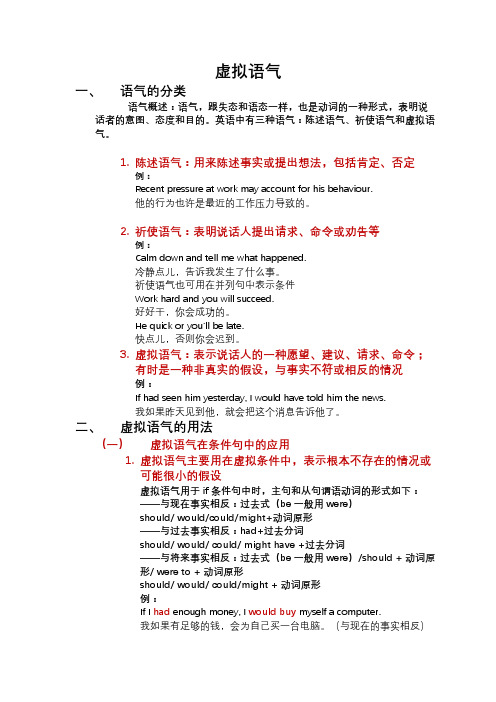
虚拟语气一、语气的分类语气概述:语气,跟失态和语态一样,也是动词的一种形式,表明说话者的意图、态度和目的。
英语中有三种语气:陈述语气、祈使语气和虚拟语气。
1.陈述语气:用来陈述事实或提出想法,包括肯定、否定例:Recent pressure at work may account for his behaviour.他的行为也许是最近的工作压力导致的。
2.祈使语气:表明说话人提出请求、命令或劝告等例:Calm down and tell me what happened.冷静点儿,告诉我发生了什么事。
祈使语气也可用在并列句中表示条件Work hard and you will succeed.好好干,你会成功的。
H e quick or you’ll be late.快点儿,否则你会迟到。
3.虚拟语气:表示说话人的一种愿望、建议、请求、命令;有时是一种非真实的假设,与事实不符或相反的情况例:If had seen him yesterday, I would have told him the news.我如果昨天见到他,就会把这个消息告诉他了。
二、虚拟语气的用法(一)虚拟语气在条件句中的应用1.虚拟语气主要用在虚拟条件中,表示根本不存在的情况或可能很小的假设虚拟语气用于if条件句中时,主句和从句谓语动词的形式如下:——与现在事实相反:过去式(be一般用were)should/ would/could/might+动词原形——与过去事实相反:had+过去分词should/ would/ could/ might have +过去分词——与将来事实相反:过去式(be一般用were)/should + 动词原形/ were to + 动词原形should/ would/ could/might + 动词原形例:If I had enough money, I would buy myself a computer.我如果有足够的钱,会为自己买一台电脑。
虚拟语气
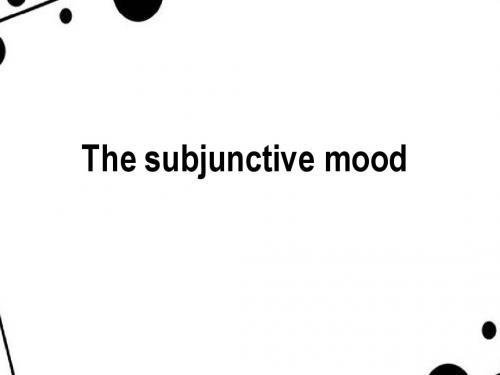
1.If I had enough money, I would buy a new car.
(have, buy)
2.We would have won if Jack had scored that goal. ( win, score) 3.If I were you , I would go to bed early tonight. 4.If it were to rain tomorrow, they would not go out . (be , go) (rain, go out).
C had it not been for the sun . D if it shouldn't be for the sun. 3. ______. Everything would have been all right. A had he been here . B here he had been .
C been here he had . D had he been here . 4.___fired, your health care and other benefits will not be immediately cut off . A would you be . C could you be . B should you be . D might you be .
B 1._____it rain tomorrow, we would have to ___the picnic. A would , put forward. C were, put off . B should , call off . D should call off.
D 2.Without electricity today , human life ____ quite different . A is . B would have been . C will be . D would be . B 3.What would you do if the war ______? A would break out . B were to break out . C will break out . D is broken out . B 4. ____he come , the problem be settled. A would , B should . C shall . D if .
英语语气的用法大全

英语语气的用法大全语气及其种类1)语气(mood)语气是一种动词形式,表示讲话人对某一行为或事情的看法和态度。
2)语气的种类语气可分为下列三种:a)直陈语气(indicative mood)表示讲话人认为他所说的话是一个事实。
如:There are two sides to every question.每个问题都有两个方面。
Jinzhou is famous for its apples.锦州以产苹果闻名。
Comrade Zhang Side had a deep love for the Party.张思德同志对党怀有深厚的爱。
b)祈使语气(imperative mood)表示讲话人对对方的请求或命令。
如:Bring along your exercise books tomorrow.明天把练习本带来。
Make yourself at home.请随便,不要客气。
Don't move! 不许动!Don't be late.不要迟到。
Be quiet! 请安静!c) 虚拟语气 (subjunctive mood)。
虚拟语气 A虚拟语气虚拟语气是一种特殊的动词形式,用来表示说话人所说的话不是一个事实,而只是一种愿望、假设、怀疑、建议、猜测、可能或纯粹的空想等。
如:If I were not so busy,I would go with you.假如我不太忙,我会和你一起去。
(表示假设)I wish Lao Li were here.H6 would know how to fix the machine.老李在这儿就好了,他会知道怎样把机器修好的。
(表示愿望)He suggests that we should all go to see the film.他建议我们都去看电影。
(表示建议)虚拟语气的动词形式比较特殊,共有下列七种:1)动词原形(用于一切人称和数)2)动词的过去式(用于一切人称和数,be的过去式用were)3) had + 过去分词(用于一切人称和数)4) should + 动词原形(用于一切人称和数)5) should have + 过去分词(用于一切人称和数)6) should (第一人称),Would(第二、三人称) + 动词原形7) should(第一人称),Would(第二、三人称) + have + 过去分词[注]上述某些动词形式和直陈语气的某些动词形式相同,但它们的用法及其所表示的时间概念则完全两样,二者切不可混淆。
英语语法之虚拟语气

虚拟语气知识要点一、语气是动词的一种形式,它表示说话人对某一行为或事情的看法和态度。
英语中有三种语气:1.述语气:表示谓语动词表示的动作/状态符合客观现实。
2.祁使语气:表示号召、命令、建议、劝告、警告、禁止等。
3. 虚拟语气:表示动作/状态不是客观现实,而是愿望、假设、推测等。
二、虚拟语气的构成例:○与将来的事实相反:1.If Professor Li should have time tomorrow, wecould ask him some questions.2.If there should be no air, there would be no livingthings.3.If it wereto snow tomorrow, they couldn’t goout. ○与现在的事实相反:1. If it rained now, I wouldnotgo shopping.2. If I were a teacher, I wouldbe strict with my students.3. If it werenot for their help, we shouldbe in a verydifficult position.○与过去的事实相反:1. If I hadcome yesterday, I wouldhaveseen him.2. If we hadstarted earlier, we shouldnothavemissedthe train.3. If she hadn’tbeen ill, she mighthavecome.***请注意三种特殊情况:○上面的句子大多都可以改成倒装句,这时If就省略了,同学们要能识别出来。
如:1. Should there be no air, there wouldbe no living things.2. Were it not for their help, we shouldbe in a verydifficult position.3. Had she not been ill, she mighthavecome.○错综时间条件句。
Subjunctive Mood
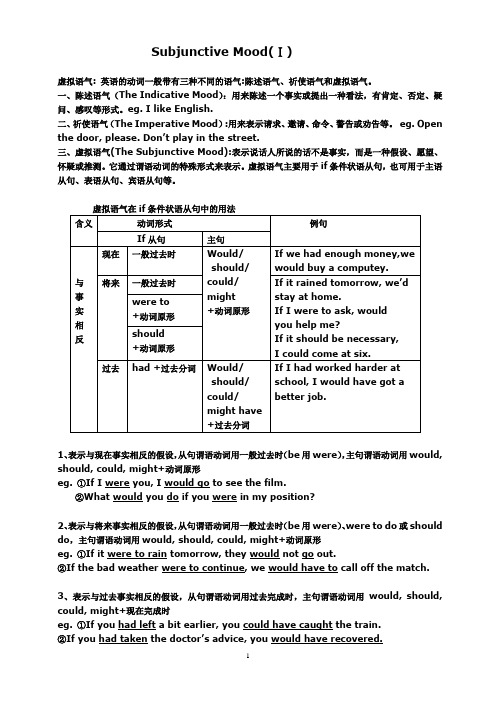
Subjunctive Mood(Ⅰ)虚拟语气: 英语的动词一般带有三种不同的语气:陈述语气、祈使语气和虚拟语气。
一、陈述语气(The Indicative Mood):用来陈述一个事实或提出一种看法,有肯定、否定、疑问、感叹等形式。
eg. I like English.二、祈使语气(The Imperative Mood):用来表示请求、邀请、命令、警告或劝告等。
eg. Open the door, please. Don’t play in the street.三、虚拟语气(The Subjunctive Mood):表示说话人所说的话不是事实,而是一种假设、愿望、怀疑或推测。
它通过谓语动词的特殊形式来表示。
虚拟语气主要用于if条件状语从句,也可用于主语从句、表语从句、宾语从句等。
虚拟语气在if条件状语从句中的用法含义动词形式例句If从句主句与事实相反现在一般过去时Would/should/could/might+动词原形If we had enough money,wewould buy a computey.将来一般过去时If it rained tomorrow, we’dstay at home.If I were to ask, wouldyou help me?If it should be necessary,I could come at six.were to+动词原形should+动词原形过去had +过去分词Would/should/could/might have+过去分词If I had worked harder atschool, I would have got abetter job.1、表示与现在事实相反的假设,从句谓语动词用一般过去时(be用were),主句谓语动词用would, should, could, might+动词原形eg. ①If I were you, I would go to see the film.②What would you do if you were in my position?2、表示与将来事实相反的假设,从句谓语动词用一般过去时(be用were)、were to do或should do,主句谓语动词用would, should, could, might+动词原形eg. ①If it were to rain tomorrow, they would not go out.②If the bad weather were to continue, we would have to call off the match.3、表示与过去事实相反的假设,从句谓语动词用过去完成时,主句谓语动词用would, should, could, might+现在完成时eg. ①If you had left a bit earlier, you could have caught the train.②If you had taken the doctor’s advice, you would have recovered.虚拟语气用在wish后的宾语从句中含义动词形式例句针对现状表达愿望(与事实相反)一般过去时I wish I had a little lab ofmy own.对过去发生事情的表示遗憾或后悔过去完成时I wish you had let meknown earlier.针对将来表达愿望(虽然可能性极小,但有实现的可能)Would/ could/ might+动词原形I wish you wouldn’t smokeany more.I wish he could come tomorrow.1、表示现在不能实现的愿望,从句谓语动词用一般过去式(be用were)eg. ①I wish it were spring all the year round.②He wishes he could paint as well as a professional artist.2、表示对过去事情的遗憾,从句谓语动词用过去完成时或could+现在完成时eg. I wish I had been with you yesterday.3、表示对将来的愿望时,从句谓语动词用would/could/ might +动词原形eg. We wish the rain would stop.※1、虚拟的条件有时可以不用条件从句表示,而是通过某些介词短语、副词或上下文等来表达,这就是含蓄条件句。
1.英语动词有三种语气,陈述语气,祈使语气和虚拟语气。

3. If I had taken your advice, I wouldn’t have made a mistake. 4. If you had come earlier, you might have caught
1.英语动词有三种语气, 陈述语 气,祈使语气和虚拟语气。
2. 定义:用来表示说的话不是事 实,或者是不可能发生的情况, 而是一种愿望,建议,假设的 语气叫虚拟语气。
一:虚拟语气在条件状语 从句 中的用法。把这个表格记下来。
现在 过去
将来
If 从句的谓语形式 主句的谓语形式
一般过去时
would/could/should /might +V.(原)
3. the
The guard rules.
of
the
meeting
insisted
that
everybody_B____
A. obeys B. obey C. will obey D. would obey
4. see
“Jack’s been a doctor.”
ill
for
some
weeks.”
Without your help, I would have failed.
But for water, it would be impossible to live in the desert.
二:虚拟语气特殊句型:
过去虚拟: 1. wish
过去完成时
宾语从句 现在虚拟:
过去时(were)
将来虚拟:
“I
know.
英语动词有 语气
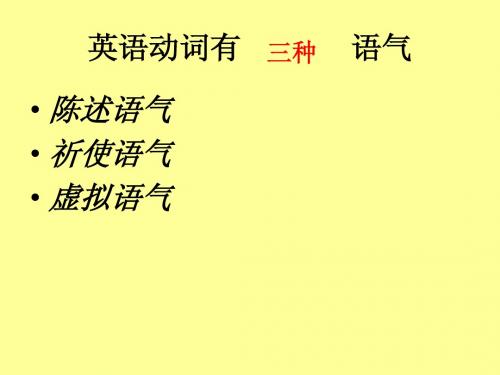
9.I B _____ you some money, but I hadn’t any on me then. A. would lend B. would have lent C. could lend D. may have lent C 10. A few minutes earlier and we _____ the rain. A. have caught B. had caught C. could have caught D. were to catch 11.--- “Have you ever been to Beijing?” --- “No, but I wish I _____” D A.have B. will C. do D. had C 12.We _____ the work on time without your help. A. hadn’t had finished B. didn’t have finished C. couldn’t have finished D. can’t have finished
• 3. If he _________ me tomorrow, I would let him know. • A. should call B. should not have been able • C. were not able to call D. are not able to call • 4. If you asked your father, you ______________ permission. • A. may get B. might get • C. should have called D. maybe get • 5. ______ today, he would get there by Friday. • A. Would he leave B. Was he leaving • C. Were he to leave D. If he leaves • 6. ______I you, I would go with him to the party. • A. Was B. Had been C. Will be D. Were
[计划]英语句子中谓语动词的语气有三种
![[计划]英语句子中谓语动词的语气有三种](https://img.taocdn.com/s3/m/76fdc3ea710abb68a98271fe910ef12d2bf9a947.png)
英语句子中谓语动词的语气有三种:1. 直陈语气(The Indicative Mood)直陈语气用于直截了当地陈述事实、描述状态:He has published quite a number of essays this year .他今年已发表了好几篇论文。
2. 祈使语气(The Imperative Mood)祈使语气用于提出请求、命令、建议或是劝告等:Wait outside until you are asked . 请在外面等候,请你进再进去。
Let's just take a break, shall we ? 我们休息一会儿,好吗?3. 虚拟语气(The Subjunctive Mood)虚拟语气用于表示主观愿望和假设的虚拟情况。
虚拟语气不太顾及事实的存在,它表现出说话人的主观因素比较多。
所以说话人所讲的内容往往是与事实相反的;或是其实现的可能性微乎其微,甚至于没有实现的可能性。
当然,有时为了使说话的语气客气、缓和、委婉,也使用虚拟语气。
例如:I wish you were more careful .但愿你更细心一些。
If I had more money, I would buy a bigger apartment.我要是有再多一点钱,我就买一套更大一些房子。
Would you mind shutting the door ? 劳驾您把门关上。
一、虚拟语气在条件状语从句中的构成和用法1. 表示一种与过去事实相反的假设情况,条件从句中的谓语动词要用“had+过去分词”,主句中的谓语动词要用“would / should / could / might+have+过去分词”。
如:If you had come here yesterday, you would have seen him. 如果你昨天来到这里,你就会看见他了。
2. 表示一种与目前事实相反的假设情况,条件状语从句中的谓语动词要用一般过去式(be动词常用were),而主句中的谓语动词则要用“would / should / could / might+动词原形”。
人教版选修6高二英语_语法复习_虚拟语气

• Nothing in the world can be as painful as this. • Just let your sword cut into my throat! Don’t hesitate! should give/were to give/gave • If the God ________________________me another chance,I_____________ the girl three words: I love would tell her! (give/tell) • If our love _________ be set a time limit, I wish it had to would be ___________ 10,000 years! (have to/ be)
These show your good wishes or dreams. It is evident that they are not real or they can’t come true
romantic , unrealistic, best wishes
(The Subjunctive Mood)表示说话人所说的 话不是事实, 而是一种假设, 愿望, 怀疑或推 测。虚拟语气主要用于if条件状语从句, 条件句:分真实条件句和虚拟条件句两 种。
guitar player
If 条件状语从句
含义 If 从句
谓语动词 might/should would/could+ did do 与过去事 would/could/ had done should might 实相反 have done
主句谓语形式
例句
与现在事 were 实相反
虚拟语气1

虚拟语气在 在条件从句中
表示与事实情况相反 条件从句的谓语形式
总结
主句的谓语形式
表示与现在事实情 况相反(present) 表示与过去事实情 况相反(past)
过去式(did/were) (be常用 were) 过去完成式 (had +done)
would / could / might / should + do would / could / might / should +have done
1.如果现在不下雨的话,我们就出去野餐了。 should go for a picnic If it________ were not raining, we _________ 2.如果他来这,他就能够帮助你了。 might be If he came _____ here, he ____________ able to help you. 3.如果我是你的话,我就会带走他们。 were you, I_______________ would take If I _______ them away.
与事实相 反 表示将来 情况
条件从句的谓语形 式 ①过去式 (did) ②should + do ③were to do
主句的谓语形式 would / could / might / should +动词原形 (do)
1.如果你成功,一切就好了。 If you ___________, everything would be all right. succeeded If you ________________, everything would be all should succeed right. If you ________________, everything would be all were to succeed right. 2.明年我要是才二十岁,我就会学计算机课程。 If I _______________ only twenty years old next were to be year, I ________________ the course of computer would take
英语动词的语气及练习

英语动词的语气及练习一、概述语气是一种动词形式,是讲话人对说话内容的看法的语法范畴,英语中有三种语气,即陈述语气、祈使语气和虚拟语气。
二、语气的种类1、陈述语气(indicative mood)表示谓语动词所表达的动作或状态是符合客观事实的,也就是说把动作或状态当作事实表达出来。
There are two sides to every question. 每个问题都有两个方面。
She is a very good student. 她是一个很好的学生。
2、祈使语气(imperative mood)表示讲话人对对方的请求、命令号召、劝告、警告、禁止。
Don’t be late for class. 上课不要迟到。
Take a seat, please.请坐。
3、虚拟语气(subjunctive mood)是一种特殊的谓语动词形式,用来表示一种假设、愿望、建议、请求、命令、猜测、可能、空想等非真实情况。
How I wish I were a bird!我多么希望我是一只小鸟!I suggest you should go to have a walk.我建议你去散步。
三、虚拟语气在非真实条件从句中的用法非真实条件句所假设的是不可能有的条件,或者是与事实相反的条件,这又可以分为三种情况。
1、表示与现在事实相反谓语动词的形式如下:If there were no subjunctive mood, English would be easier.I'd come too if I had time to spare.我如果抽得出时间的话,我也愿意来。
(与现在事实相反)If everyone in the country knew first aid,many lives would be saved.如果每个国民都懂得怎样急救,那么就可以挽救许多人的生命了。
(与现在事实相反)If I were you, I should do it.如果我是你的话,我就要做这件事。
【高中英语】高中英语语法:动词的语气
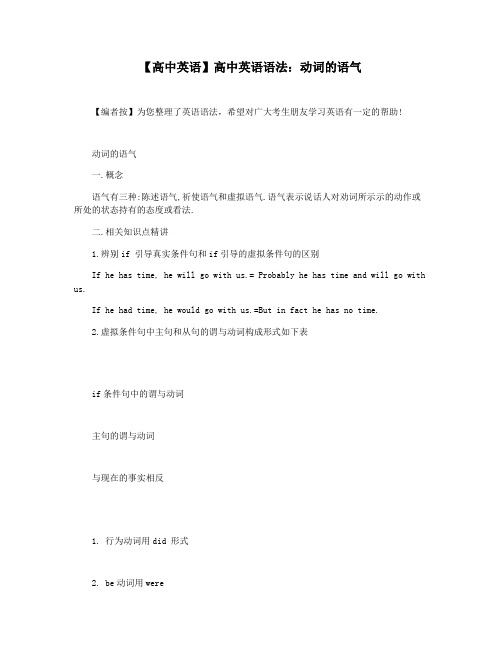
【高中英语】高中英语语法:动词的语气【编者按】为您整理了英语语法,希望对广大考生朋友学习英语有一定的帮助!动词的语气一.概念语气有三种:陈述语气,祈使语气和虚拟语气.语气表示说话人对劝词所示示的动作或所处的状态持有的态度或看法.二.相关知识点精讲1.辨别if 引导真实条件句和if引导的虚拟条件句的区别If he has time, he will go with us.= Probably he has time and will go with us.If he had time, he would go with us.=But in fact he has no time.2.虚拟条件句中主句和从句的谓与动词构成形式如下表if条件句中的谓与动词主句的谓与动词与现在的事实相反1. 行为动词用did 形式2. be动词用wereshouldwouldcould + 动词原形might与过去的事实相反had + doneshouldwouldcould + have + done might与将来的事实相反1. 行为动词用did2. should + 动词原形3. were to + 动词原形shouldwouldcould + 动词原形might3.混合时间的虚拟语气如果条件句中的动作和主句的动作不是同时发生,主句和从句的谓语动词的形式应分别根据各自所表示的时间加以调整。
1)0If I had received the passport yesterday, I would start today.2)If he had telephoned me last night, I would see him now.3)If he had followed the doctor’s advice, he would be all right now.4)If China had not been liberated, the working people would still be leading a miserable life.4.should/ could / might/ ought to + have done 表示“过去本应该/可以做而实际上却没做”needn’t have done 表示“过去没必要作而实际上做了”5.虚拟语气中的倒装句如果虚拟语气的条件从句谓语动词中含有were, had, could, should,有时可将if 省去,而将条件从句的主语置于were, had, should, could 之后。
语气(mood)是一种动词形式虚拟语气Ⅰ

虚拟语气语气(mood)是一种动词形式,用以表示说话者的意图或态度。
英语中的语气有三种:陈述语气、祈使语气和虚拟语气。
直陈语气(indicative mood),表示所说的话是事实。
祈使语气(imperative mood),表示所说的话是请求或命令。
虚拟语气(subjunctive mood),表示说的话不是事实,或者是不可能发生的情况,而是一种愿望、建议或与事实相反的假设等。
一. 虚拟语气在条件句中的应用学习虚拟语气在条件句中的用法之前我们必须清楚条件句的种类:条件句有真实条件句与非真实条件句(或称虚拟条件句)两种。
真实条件句所表的假设是可能发生或实现的,句中的条件从句与结果主句都用陈述语气。
如:If it doesn’t rain tomorrow, I will go for a picnic. 假若明天不下雨,我就去野餐。
Oil floats if you pour it on water. 你如把油倒在水里,油就浮起来。
虚拟条件句所表的假设则是不可能或不大可能发生或实现的,句中的条件从句与结果主句皆须用虚拟语气。
1. 与现在事实相反的虚拟条件句,条件从句的谓语用动词的过去式(be的过去式用were), 主句的谓语用should (would, might,could)+动词原形。
如:If it were not raining, we should go for a picnic.如果现在不下雨的话,我们就出去野餐了。
(事实是:天在下雨,我们不能出去野餐。
表示愿望。
)If he came here, he might be able to help you. 如果他来这,他就能够帮助你了。
(事实是:他没来这,他不可能帮助你。
表示对他的良好印象。
)2. 与过去事实相反的虚拟条件句,条件从句的谓语用had+过去分词,主句的谓语用should (would, might,could)+ have +过去分词。
英语中的语气
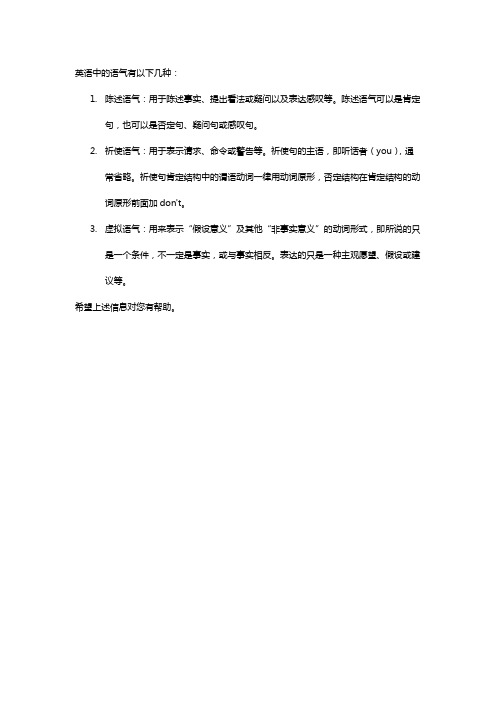
英语中的语气有以下几种:
1.陈述语气:用于陈述事实、提出看法或疑问以及表达感叹等。
陈述语气可以是肯定
句,也可以是否定句、疑问句或感叹句。
2.祈使语气:用于表示请求、命令或警告等。
祈使句的主语,即听话者(you),通
常省略。
祈使句肯定结构中的谓语动词一律用动词原形,否定结构在肯定结构的动词原形前面加don't。
3.虚拟语气:用来表示“假设意义”及其他“非事实意义”的动词形式,即所说的只
是一个条件,不一定是事实,或与事实相反。
表达的只是一种主观愿望、假设或建议等。
希望上述信息对您有帮助。
- 1、下载文档前请自行甄别文档内容的完整性,平台不提供额外的编辑、内容补充、找答案等附加服务。
- 2、"仅部分预览"的文档,不可在线预览部分如存在完整性等问题,可反馈申请退款(可完整预览的文档不适用该条件!)。
- 3、如文档侵犯您的权益,请联系客服反馈,我们会尽快为您处理(人工客服工作时间:9:00-18:30)。
英语中,人们常常用不同的动词形式来表达自己的不同看法和态度。
这种动词的形式就叫做动词的语气。
英语动词有陈述语气、祈使语气和虚拟语气。
1. 陈述语气
叙述事实或者可能发生的事情时,人们所使用的语气就是陈述语气。
如:
I’m a boy of sixteen this year. 今年我是个十六岁的男孩了。
I want to travel in the space like Yang Liwei. 我想象杨力伟那样去太空旅行。
He’ll come here to see me next Sunday. 下周星期天他要来看我。
2. 祈使语气
人们用来表示命令、要求、请求、邀请、劝告或建议时所使用的语气就是祈使语气。
如:Hurry up. 快点。
Don’t go there. 不要去那儿。
Open your books at P. 126. 翻开书126页。
3. 虚拟语气
表示所说的话不是事实,而只是一种愿望、猜测、假设、建议,并且这种愿望、建议等实现的可能性很少或根本不能实现时,所使用的语气就是虚拟语气。
如:
If I were a bird, I could fly in the sky freely. 要是我是一只鸟,我就能自由自在地在天空飞翔。
I wish you a happy new year. 祝你新年愉快。
I’d rather you came this afternoon. 我倒想要你今下午来。
Thank you very much indeed. If it had not been for your advice I really _________ what I should have done.
A. don’t know
B. didn’t know
C. hadn’t known
D. wouldn’t have known。
